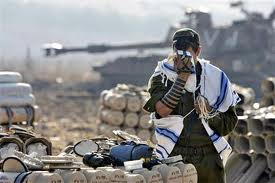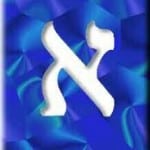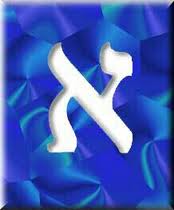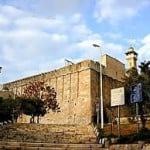We are living in a world that seems to be moving towards upheaval and confusion. We see signs of that upheaval all around us. How are we to understand those signs. How wary must we be of reading too much into those signs? In the parsha we see that there was a time when G-d openly used signs and wonders to help us re-navigate back towards Him and His purpose. The malady of Tzaraat was such a sign.
The strength of a Jewish Army
“Aaron lifted up his hands” …..The strength of a Jewish Army
 We are entering into another period of unease around our borders. The Hamas is sending missiles into Beersheba and Ashdod. The Hezbollah is busy arming themselves and the Fatah are cozying up with their more militant allies in the Gaza strip .Murderers are being sent by Palestinian leadership into the houses of innocent civilians .Terror has returned to the streets of Jerusalem. It is a time of concern and edgy readiness..
We are entering into another period of unease around our borders. The Hamas is sending missiles into Beersheba and Ashdod. The Hezbollah is busy arming themselves and the Fatah are cozying up with their more militant allies in the Gaza strip .Murderers are being sent by Palestinian leadership into the houses of innocent civilians .Terror has returned to the streets of Jerusalem. It is a time of concern and edgy readiness..
Gathering the Ashes
 As we enter the week of Purim we are very aware that it is a time of “NaFochHu” , a time of dramatic overturn.” as the days when the Jews rested from their enemies, and the month that was reversed for them from grief to joy and from mourning to a festive day-“( Esther 9:22) . Yet such a time also bespeaks of a difficult and painful time that precedes the reversal into days of joy and gladness. Such is the situation during this Purim which will fall just as the mourners for the Fogel family “stand up” to re-enter life. A life that is a mixture of spiritual fire together with the cold ashes of what was.
As we enter the week of Purim we are very aware that it is a time of “NaFochHu” , a time of dramatic overturn.” as the days when the Jews rested from their enemies, and the month that was reversed for them from grief to joy and from mourning to a festive day-“( Esther 9:22) . Yet such a time also bespeaks of a difficult and painful time that precedes the reversal into days of joy and gladness. Such is the situation during this Purim which will fall just as the mourners for the Fogel family “stand up” to re-enter life. A life that is a mixture of spiritual fire together with the cold ashes of what was.
The Shrinking Aleph and Amalek
 The book of VaYikra begins with a mystery. The verse reads “And He called to Moses, and HaShem spoke to him from the Tent of Meeting, saying, (Leviticus 1:1). The word VaYikra (and He called) ends with the letter “Aleph “that is shrunken in size.
The book of VaYikra begins with a mystery. The verse reads “And He called to Moses, and HaShem spoke to him from the Tent of Meeting, saying, (Leviticus 1:1). The word VaYikra (and He called) ends with the letter “Aleph “that is shrunken in size.
Our sages explain that small “Aleph” with a Midrash that points to Moshe’s trait of humility.
The Cloud of Hashem’s Glory
The Ananei haKavod, the clouds of glory, conveyed a message. Their arrival and their departure clearly imparted a lesson and deep instruction. We read the following after the beginning of the building of the Mishkan:
And the cloud covered the Tent of Meeting, and the glory of HaShem filled the Mishkan. . Moses could not enter the Tent of Meeting because the cloud rested upon it and the glory of HaShem filled the Mishkan. ( Exodus 40 :34-35 )
Why did that cloud fill the tent specifically at this time? What did it signify? What was it about this Anan of HaShem’ , Glory that caused Moshe to stand outside of the tent of Meeting.
The Jewish connection to the land and to Hebron
The people who have gone ballistic over student heritage trips to Hebron seem to have forgotten the very foundation of Zionism.
Who are the people, including the editorial writers of this newspaper, who have gone ballistic over the education minister’s announcement that students should be taken on heritage trips to the Tomb of the Patriarchs in Hebron? Are they Zionists, non-Zionists, post-Zionists or anti-Zionists?
Thomas Friedman is full of himself
 Yet Thomas Friedman will play his arrogant scolding parent posture to the hilt. That is the role he plays when he condescendingly declares that “Israel today really is behaving like a spoiled child.”.He continues it when he pontificates about how “Israel needs a wake-up call”. It continues with the title of his op-ed aimed at all the wrongs of Israel called “Just knock it off,”. Friedman actually descends into an even more pathetic almost pouting stance when confronted with Obama’s deteriorating relationship with Israel . He then plaintively declares without any corroborating facts the following “Please spare me the nonsense that President Obama is anti-Israel…He’s doing his job.”
Yet Thomas Friedman will play his arrogant scolding parent posture to the hilt. That is the role he plays when he condescendingly declares that “Israel today really is behaving like a spoiled child.”.He continues it when he pontificates about how “Israel needs a wake-up call”. It continues with the title of his op-ed aimed at all the wrongs of Israel called “Just knock it off,”. Friedman actually descends into an even more pathetic almost pouting stance when confronted with Obama’s deteriorating relationship with Israel . He then plaintively declares without any corroborating facts the following “Please spare me the nonsense that President Obama is anti-Israel…He’s doing his job.”
True Leadership and Priestly Garments
 The word for clothing in Hebrew is “Beged” and its root seems to be connected to the Hebrew word for betrayal and deception, BAGAD, for after all the role of clothing is to hide and conceal. We are living in a time and in a world where falsehood and evil is dressed up in pretty clothing and flourishes unchallenged. The commonly heard phrase is that “the clothes make the man”.
The word for clothing in Hebrew is “Beged” and its root seems to be connected to the Hebrew word for betrayal and deception, BAGAD, for after all the role of clothing is to hide and conceal. We are living in a time and in a world where falsehood and evil is dressed up in pretty clothing and flourishes unchallenged. The commonly heard phrase is that “the clothes make the man”.






